Key takeaways
- Experiential learning connects theory to real-life application, enhancing understanding and retention.
- Reflection on experiences is crucial; it transforms action into deeper insights and understanding.
- Education is a social process, benefiting from collaboration and diverse perspectives among learners.
- Implementing experiential learning can be challenging due to unpredictability and resource constraints, but it enriches the educational experience.
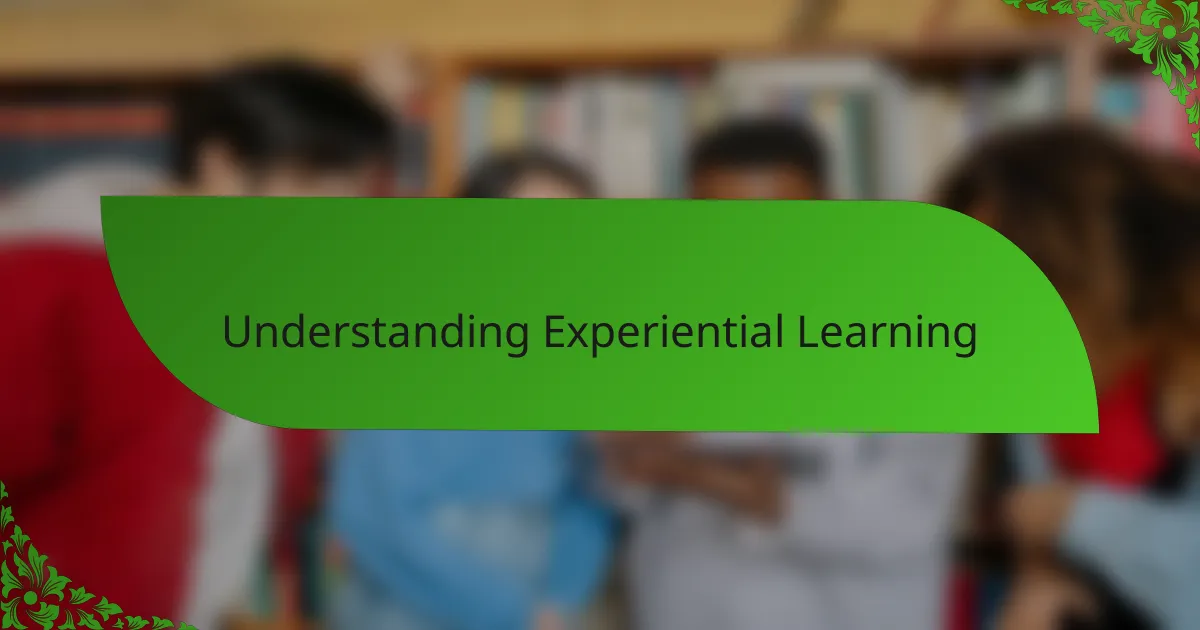
Understanding Experiential Learning
Experiential learning, as I see it, is learning through direct experience—it’s about doing and reflecting rather than just memorizing facts. Have you ever noticed how a lesson sticks with you longer when you’ve actually practiced it yourself? That’s the core of Dewey’s idea: knowledge isn’t something handed down; it’s something we build from our own encounters with the world.
From my own experience, the power of experiential learning lies in its ability to connect theory with real life. I remember struggling with abstract concepts in philosophy until I engaged with lively discussions and real-world examples, which transformed those dry ideas into something meaningful. Dewey emphasized this connection because learning that doesn’t involve personal experience feels empty and disconnected.
But why does experience matter so much? For Dewey, it’s because we’re active agents in our learning journey. Without engaging emotionally and practically, learning becomes passive and dull. So I often wonder, how much deeper would our understanding be if education always invited us to experience first and reflect second?
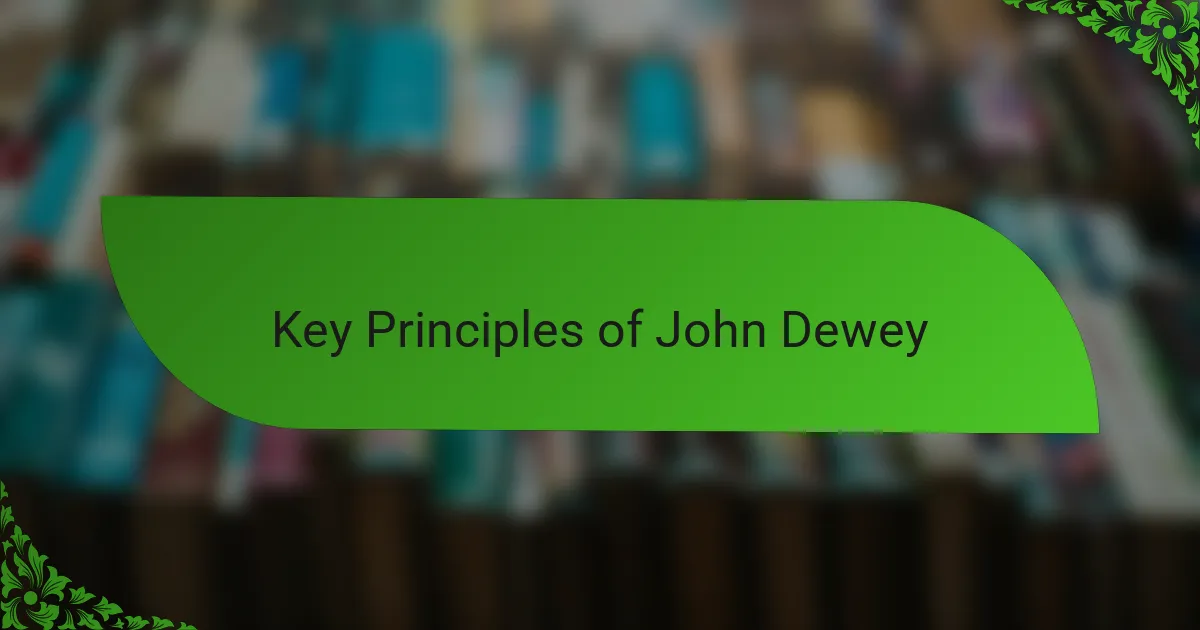
Key Principles of John Dewey
Dewey believed that education should be rooted in real-life experiences rather than abstract memorization. This principle resonates with me because I’ve seen firsthand how learning becomes richer when students connect ideas to tangible situations. Have you ever felt that spark when theory suddenly “clicks” because you’ve lived it somehow? That’s Dewey’s experiential learning in action.
Another key principle Dewey highlighted is the importance of reflection. It’s not enough just to do; we need to think about what we’ve done. I recall moments when a simple activity, followed by thoughtful discussion, revealed layers of meaning I hadn’t noticed before. Reflection transforms experience from mere action into genuine understanding.
Finally, Dewey emphasized education as a social process. Learning isn’t isolated; it happens through interaction and collaboration. I often find that discussing experiences with others opens up new perspectives and deepens my insight. Isn’t it fascinating how our ideas evolve when shared and challenged within a community? This social dimension makes learning dynamic and alive.
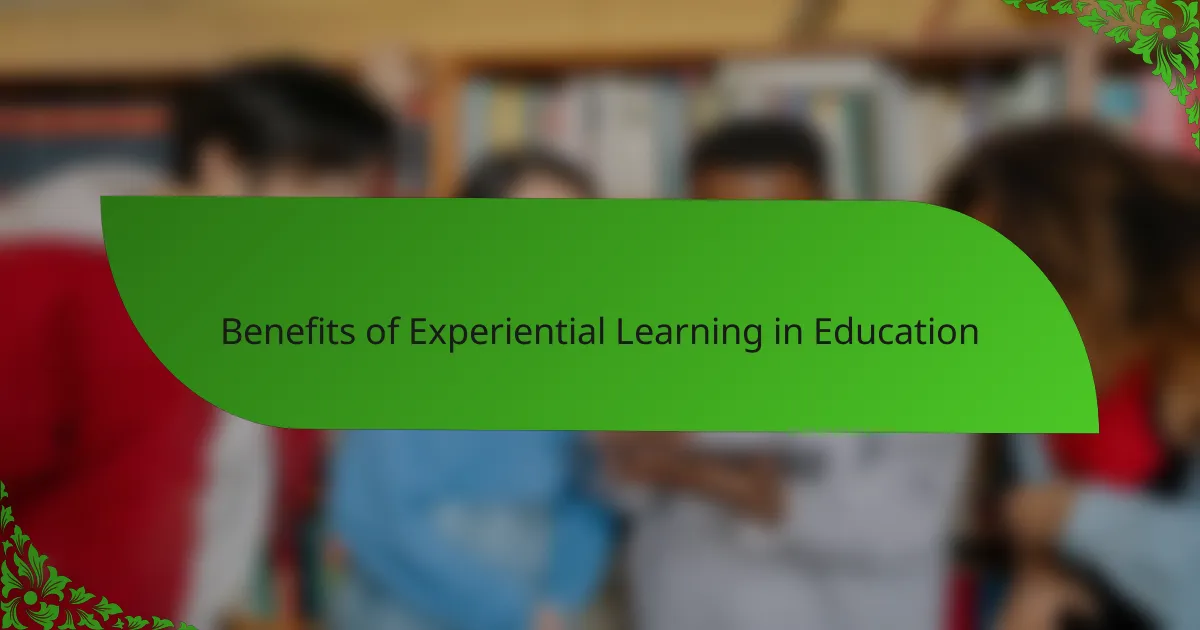
Benefits of Experiential Learning in Education
One of the biggest benefits of experiential learning is how it makes education feel alive and relevant. When I’ve had the chance to apply concepts in real situations, the material stops being abstract and starts making sense in a personal way. Have you ever noticed how a lesson practiced hands-on tends to stick with you far longer than one just read about?
Another advantage I’ve seen is the boost to critical thinking that comes from reflecting on experiences. It’s not just about doing something; it’s about stepping back and asking, “What did this mean? How did it change my thinking?” Those moments of reflection helped me uncover deeper insights that pure memorization never could.
Beyond individual understanding, experiential learning also fosters collaboration and communication. I remember working through complex ideas with peers during activities—it wasn’t just about my own perspective anymore, but about listening, debating, and reshaping thoughts together. Doesn’t learning become richer when it’s shared and challenged in a community?
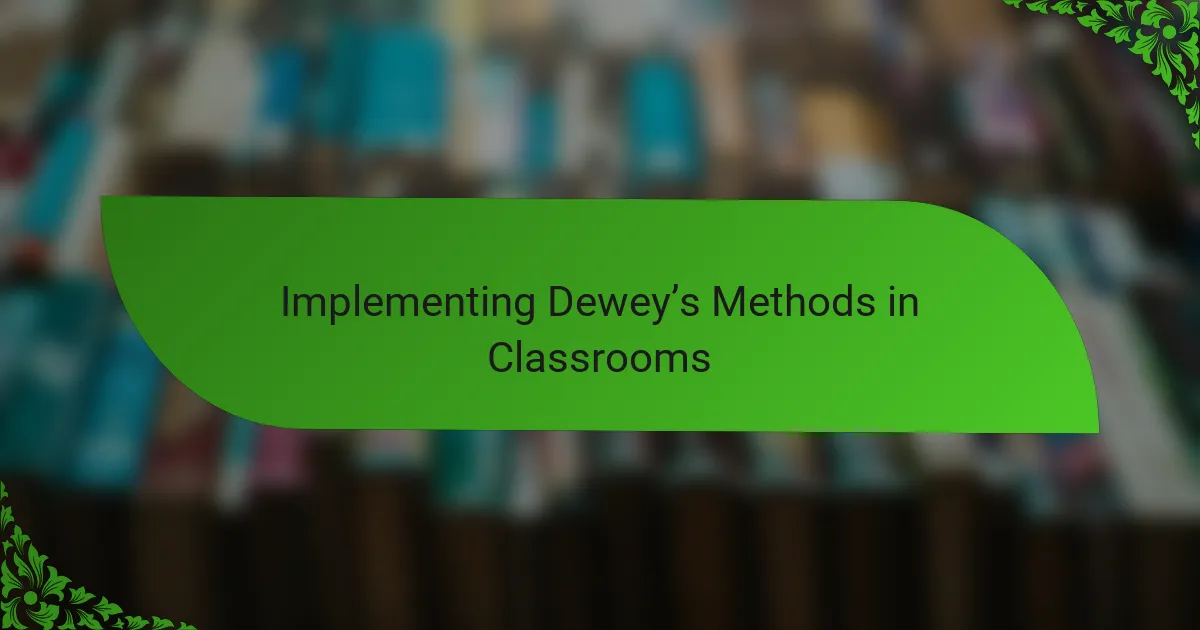
Implementing Dewey’s Methods in Classrooms
Bringing Dewey’s methods into the classroom isn’t just about changing lessons—it’s about shifting how we think of teaching and learning. I’ve noticed that when educators create opportunities for students to dive into hands-on projects, those students become more curious and invested. Isn’t it exciting to see learners lighting up when they realize they’re not just absorbing facts but actually creating knowledge through experience?
Reflection plays a big role here, too. In classes where I’ve encouraged students to discuss their experiences after activities, I’ve witnessed a transformation: abstract ideas suddenly gain personal meaning. Why do you think pausing to reflect makes such a difference? For me, it’s because reflection turns doing into understanding.
Finally, Dewey’s emphasis on social interaction means classrooms shouldn’t be silent zones but buzzing hubs of conversation and collaboration. I recall a philosophy class where, after a group activity, the debates and diverse viewpoints led to insights none of us expected. Could it be that learning becomes truly alive only when it’s shared and challenged among peers? That’s the kind of classroom I strive to be part of.
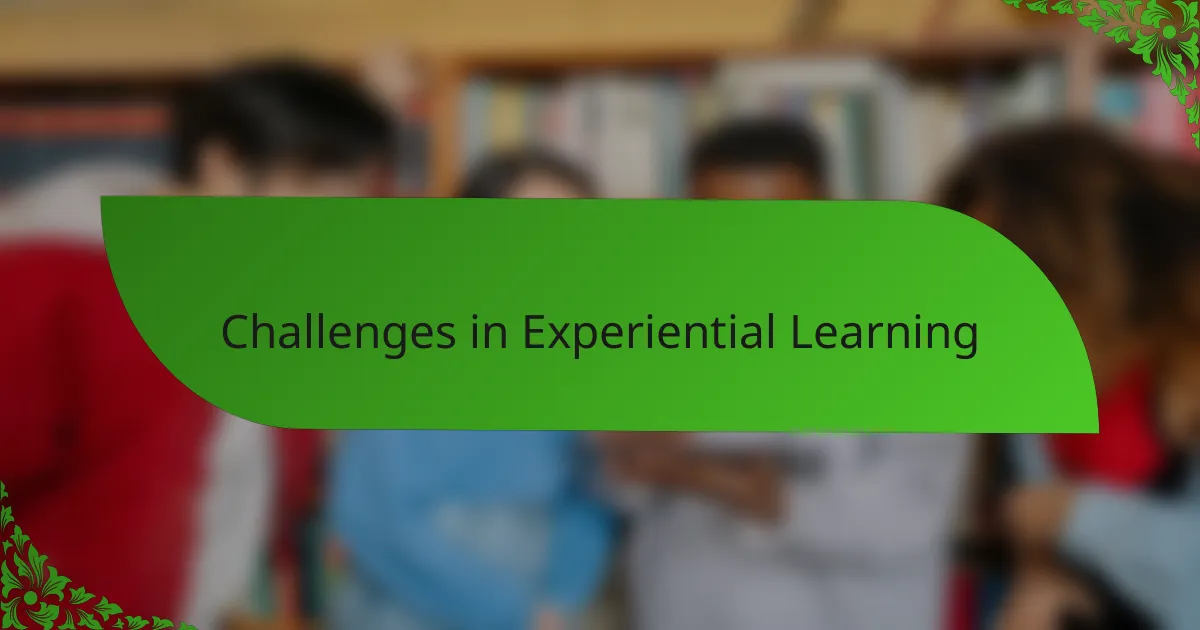
Challenges in Experiential Learning
Experiential learning sounds ideal, but it’s not without its hurdles. One challenge I’ve often encountered is that real-world experiences can be unpredictable and messy, making it hard to ensure consistent learning outcomes for every student. Have you ever planned a perfect activity only to have it veer off course? That uncertainty can be frustrating but also teaches adaptability.
Another difficulty lies in balancing action with reflection. I’ve witnessed situations where students dive into doing without pausing to think deeply about their experiences, missing out on the insights Dewey emphasized. So, how do we effectively encourage meaningful reflection without it feeling like just another task? From my perspective, integrating reflection as a natural conversation rather than a forced assignment helps.
Finally, implementing experiential learning can be demanding for educators. Designing authentic experiences that connect with diverse learners takes time and resources, and not every institution supports that fully. I’ve felt the tension between wanting to engage students deeply and the constraints of curriculum and time. Don’t these challenges remind us that meaningful education is a complex, evolving process?
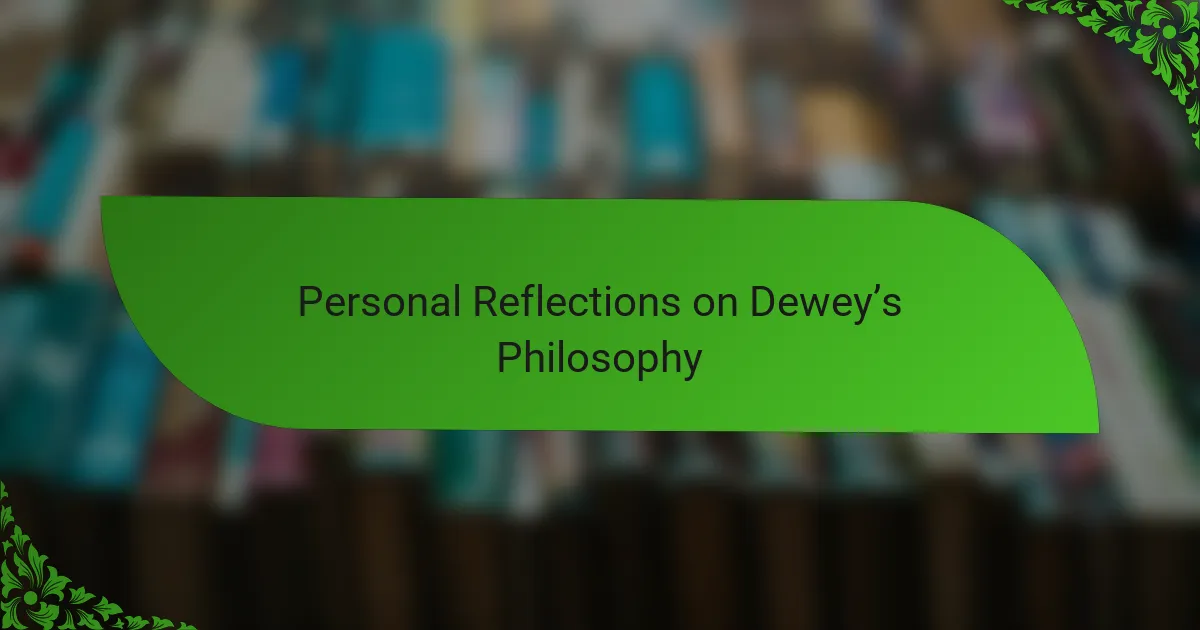
Personal Reflections on Dewey’s Philosophy
What strikes me most about Dewey’s philosophy is its profound respect for the learner as an active participant, not just a passive receiver. I often reflect on moments when I felt truly engaged—those times when I wasn’t just listening but experimenting and responding—and I realize how much Dewey’s ideas predicted that transformation in education. Isn’t it remarkable how his emphasis on experience still challenges conventional schooling today?
Sometimes, I find myself questioning whether the traditional focus on standardized testing leaves enough room for Dewey’s vision of learning through lived experience. In my teaching and learning, I’ve seen firsthand that fostering curiosity and reflection creates lasting understanding, yet these elements can feel sidelined. Could we be missing the heart of education by ignoring Dewey’s call to connect thought with action?
Ultimately, Dewey’s philosophy reminds me that education is not about filling empty vessels but cultivating thoughtful, reflective individuals. I recall a time when a simple classroom experiment led to an unexpected insight shared among students, sparking a collective moment of discovery. Those experiences stay with me—they affirm that learning grounded in experience isn’t just effective; it’s deeply human.